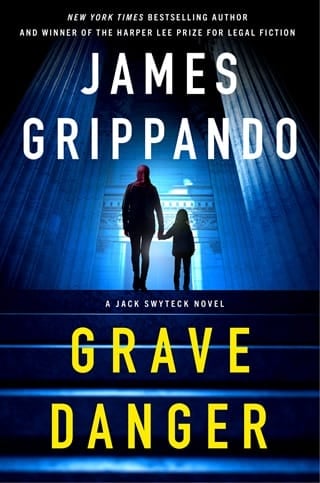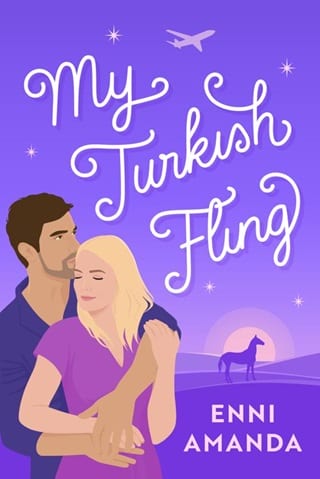Chapter 26
Zahra went straight from the courthouse to the mosque for Jumu’ah.
Friday is not technically the Muslim sabbath, so Zahra was not prohibited from appearing in court, but it is the holiest day
of the week in the Islamic tradition, believed to be filled with blessings and mercy for all. Zahra’s favorite hadith as a
schoolgirl was “The best day on which the sun rises is Friday.” Her father would from time to time remind her that “the Prophet,
peace be upon him, has noted that the day of judgment will occur on Friday.” The irony was not lost on her that she’d never
felt more judged in her life, and it was indeed a Friday.
Pickup time at Yasmin’s elementary school was 3:30 p.m. Zahra arrived at 3:00, parked in the visitor lot, and walked to the
public playground across the street. She had an appointment. Theo Knight was waiting at the picnic table next to the monkey
bars.
“You came,” she said, a little surprised.
“All you ever had to do was ask.”
Zahra took his remark as a reference to the fact that she’d never taken up Theo’s offer to be a bodyguard. She took a seat
across from him at the picnic table. It was a warm afternoon for late October. Zahra removed her head covering, which she
was still wearing from Jumu’ah.
“I just came from the mosque,” she said. “It’s not mandatory for women to attend Friday-afternoon prayer, especially mothers
whose lives are filled with family responsibilities. But I like to go.”
“That’s cool,” said Theo.
“Muslims believe there are extra-special times when our dua s have a very high chance of being accepted. At the Friday service there is a special time set aside for dua .”
“What is ‘dua’?”
“It’s very different from the five daily prayers. Dua is a chance to worship Allah and call upon him for whatever it is we need. It could be anything. Salt for your food. Wisdom
to raise your adopted daughter. Strength to handle the death of a younger sister.”
“Is that your dua ?”
“I go light on the salt.”
Theo smiled a little, and Zahra continued.
“I’m afraid your friend Jack no longer believes me.”
“About what, specifically?”
“Ava, for one. He went so far as to ask me if I was playing him—if Ava is still alive.”
“The important thing is whether the judge believes you.”
“True. But it is becoming a bad pattern with Jack. His... skepticism. I’m not sure he even believes me when I say Farid
is an abuser.”
“That’s between you and Jack.”
“No, not entirely. I think he is hearing it from you.”
“Hearing what from me?”
“I know you confronted Farid when he visited your club. You must have given Jack your take on whether Farid is a good man
or the awful person I’ve described to Jack.”
“What I said to Jack was, like, ‘Take it for what it’s worth.’”
Zahra glanced at the school building across the street. Dismissal was underway at the circular drive at the main entrance.
Teachers were organizing students into somewhat straight lines for pickup.
“My daughter is six years old,” said Zahra. “I don’t want to put her on the witness stand.”
“I understand.”
“You’re forcing me to do it.”
“Me? How?”
“I might not be able to win this case without her testimony.”
“How is that my fault?”
“Something has changed about Jack. I know he and his wife are having some kind of difficulties. Maybe he is worried about losing his own daughter and is sympathizing with Farid.”
“That’s not Jack,” said Theo.
“I agree. Which leaves only one other possibility, as I see it. He actually believes Farid.”
“I can’t help you with that.”
“You are Jack’s best friend. He trusts what you say.”
“I’m not sure what you’re asking me to do.”
“It’s simple. I want my lawyer back. My fighter. Whatever you’ve told him about Farid, tell him you were wrong. Because you
are wrong. Dead wrong.”
Zahra met his gaze and held it for a moment.
“Yasmin’s waiting for me. Good day, Mr. Knight.”
She rose from the table and started toward the school.
Andie spent most of the afternoon at the federal courthouse, waiting in the lobby outside courtroom 4. Testifying in criminal
prosecutions was one of the things she liked least about being a law enforcement officer, but it was an important part of
her job.
This latest case had grown out of an undercover assignment. The defendant claimed that Andie had entrapped him by befriending
him over drinks. “A drink” was as far as it had gone, but the defendant’s attorney would probably accuse her of everything
from performing oral sex to promising him a threesome with Margot Robbie. No disrespect to Jack, but sometimes the term criminal lawyer fit.
The double entrance doors to the courtroom opened, and the prosecutor stepped into the lobby. Andie had known Daniela Diaz
almost ten years and testified in her cases at least a half dozen times. Daniela had never failed to get a conviction.
Andie rose from her seat on the bench as Daniela approached.
“How much longer do I have to wait?” asked Andie.
“Hopefully not too much,” said Daniela.
“That’s what you said two hours ago.”
The prosecutor just shrugged, as if to say there was nothing she could do. Andie didn’t fault her. The hearing was in a brief
recess, and they’d already talked ad nauseam about Andie’s testimony. Small talk was in order.
“I see your husband is in the news again,” said Daniela. “Ava Bazzi: Dead or Alive?”
“Yeah, the media seems to be all over it.”
“I like Jack. He’s a good guy.”
“I agree. Most of the time.”
“For what it’s worth, I think he’s on the right side of this one.”
Andie did a double take. “You think Ava Bazzi is dead?”
“Yeah. Don’t you?”
There was no reason a Miami prosecutor in the US Attorney’s Office would know anything about the State Department’s confidential
dossier on Ava Bazzi.
“I don’t know,” said Andie. “But I’m curious to know why you think she’s dead.”
“I have my reasons,” she said coyly.
“You mind telling me?”
“Just between us overworked and underpaid warriors?” asked Daniela.
“Of course.”
Daniela lowered her voice. “About eight months ago, Homeland Security referred a case to the Miami office for criminal prosecution.
It involved an application for a U visa. It was supposedly submitted by Ava Bazzi.”
The fact that Daniela was willing to say even that much only confirmed that she knew nothing about the confidential dossier
or the latent fingerprints found on the U visa application. Andie played dumb.
“Homeland Security asked you to prosecute Ava Bazzi?”
“Not Ava. Zahra Bazzi. For submitting a fraudulent U visa application under her sister’s name.”
The State Department had told Andie nothing about the referral for criminal prosecution. She wondered if Jack was aware.
“Was it Homeland Security’s position that Ava Bazzi had no connection to the application?”
“No connection?” she said, seemingly amused. “That’s an interesting choice of words.”
“What do you mean?”
“To put a finer point on it, Homeland Security told us that the application was a fraud because Ava Bazzi is dead.”
Andie froze, the words echoing in her mind. Ava Bazzi is dead .
“What happened to Homeland’s referral for criminal prosecution?” asked Andie.
“It just shut down. Hard stop. No explanation.”
The courtroom doors opened. A junior prosecutor stepped out and hurried toward Daniela. “The judge is back,” he said.
“Gotta go,” she told Andie. “Hang tight. This may be your turn.”
“Sure,” said Andie.
Daniela hurried back into the courtroom.
Slowly Andie returned to her seat on the bench, her testimony the farthest thing from her mind. Instead she was reeling from
the pivot from “Ava is dead” to “Ava is alive.” It was like a dust storm of confusion, but as it settled, she was able to
break things down to a couple of key questions.
Had they pivoted from “Ava is dead” to “Ava is alive” because they found the latent fingerprints on the application? Or had
they “found” the latent fingerprints because—for some other reason—they had already pivoted from “Ava is dead” to “Ava is
alive?”
Andie didn’t know the answer. But she knew what Jack would say.
It was after sunset, and an unseasonably hot day in Miami had transformed into a pleasant evening. The noisy blast of her
car’s air conditioner was no longer needed to keep cool. Zahra turned off the engine and rolled down the driver’s-side window.
She was parked in a metered space on the street outside the hotel. Farid’s hotel.
She’d been there nearly forty-five minutes, debating whether to act on her impulse and go inside the hotel or just put the car in gear and go home. Her meeting at the playground had left her with little hope that Theo would do anything to persuade Jack that she, not Farid, was telling the truth. It was going to take more drastic measures to regain her courtroom warrior. If she couldn’t convince Jack, she had no hope of winning over the judge.
Unless she could get through to Farid, directly.
It was definitely a long shot. But if Farid knew she was willing to do whatever it took to win the case, it might make a difference.
If he knew—or at least believed —Zahra was willing to put Yasmin on the witness stand, maybe he would back down. Maybe. She had to try.
Zahra put on her headscarf and checked herself in the rearview mirror. Not as pretty as Ava. Not as young as Ava. But stronger
than Ava.
She opened the door, climbed out of the car, and walked toward the hotel entrance.
 Fullepub
Fullepub 



